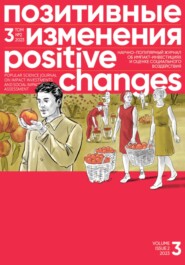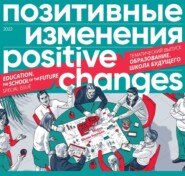По всем вопросам обращайтесь на: info@litportal.ru
(©) 2003-2024.
✖
Позитивные изменения. Тематический выпуск «Экономика будущего» (2023). Positive changes. Special issue «The economy of the future» (2023)
Настройки чтения
Размер шрифта
Высота строк
Поля
In the interview for Positive Changes Journal, Professor Sachs shared his vision for the economy of the future and talked about the reasons why we should strive for human wellbeing and have globally agreed goals, as well as whether humanity can ever end poverty and whether AI might help overcome inequality.
Jeffrey Sachs
It is no exaggeration to say that Jeffrey Sachs is one of the most famous economists in the world. According to Wikipedia, Professor Sachs has twice been named one of the 100 most influential world leaders by Time magazine, the New York Times has called him “probably the most important economist in the world,“ and according to The Economist he is one of the three most influential economists of the last decade[6 - Read more about Jeffrey Sachs: https://en.wikipedia.org/wiki/Jeffrey_Sachs]. His books on the end of poverty and world sustainable development strategies have become bestsellers. Currently he is Professor and Director of the Center for Sustainable Development at Columbia University[7 - Official website of Professor Sachs: https://www.jeffsachs.org/]. For many years in a row, Jeffrey Sachs is Special Adviser to UN Secretary-General on the combating poverty.
Many people say that it makes little sense to make predictions, given the times we are living in. Although you are probably used to making forecasts in turbulent periods – so we’ll still ask: What do you think the global economy can and should become in the near future?
We need to set clear goals, notably to achieve sustainable development in all parts of the world. This means that all regions of the world achieve economic wellbeing, social inclusion, and environmental sustainability. The globally agreed Sustainable Development Goals, the Paris Climate Agreement, and the Kunming-Montreal Biodiversity Framework have established globally agreed goals, yet national governments are not on track to achieve these goals. Our global energies are being depleted by conflict and geopolitical tensions. We need to end the conflicts, achieve a true multi-polar world, and refocus on long-term investments in clean energy, education and health for all, and other key public investments for sustainable development.
In “The Price of Civilization“ you write about the importance of paying attention to the distant future and developing long-term plans. In the long run, what economic development model should we strive for and what should we do now to achieve it? We should strive for human wellbeing. That sounds simple, but in fact our political systems struggle for war, domination, hegemony, wealth, and many other misguided objectives. It would be enough to achieve peace, prosperity, justice, and environmental sustainability, without imperial objectives and without the unending risk of major war, even of nuclear war.
You were one of the creators of the Millennium Development Goals, which later became known around the world as Sustainable Development Goals (SDGs). What can you say about the impact of this project – in your opinion, how has the world changed thanks to the emergence of the SDGs? It is important to have globally agreed goals.
They can set humanity on a proper path. Yet our political systems do not intensively pursue the goals, even when they have been globally agreed. We are still trying to surmount the realities of military competition and alliances, and harmful interstate competition. For example, in my view, NATO should have been ended at the same time that the Warsaw Pact military alliance was ended. Europe could have achieved collective security through the OSCE. Unfortunately, the US rejected that wise course of action.
One of the most pronounced trends in the last decade has been the movement toward a social economy. It seems to be a new way of looking at economics, one that fuses together developed and developing countries, left and right, liberal and conservative, private and public. In your opinion, how viable is this trend and can we say that the future is indeed bright for the social economy? The most successful political-economic system of the 20th century was Social Democracy, especially as carried out in Scandinavia. Central planning was not successful, and the Anglo-Saxon model of neoliberalism also fails in deep ways. Yet in the 21st century, the social democratic ethos is both admired and at threat. Inequality is widening, especially in the US. The US political system is in the hands of corporate lobbies. We have no accepted global model. China has had significant successes in rapid economic development, but also faces big challenges of inequality, and hence China is now experimenting with the concept of “Common Prosperity.“ I tend to favor the idea of Sustainable Development, meaning the merger of four key ideas: 1) economic wellbeing, based on the deployment of skills and technology; 2) social justice, based on universal access to public services, quality education, and fiscal redistribution; 3) environmental sustainability, especially directed at a safe climate, sharply reduced pollution, and conservation of biodiversity; and 4) global cooperation under the UN Charter, with a multipolar global politics.
Following up on the previous question, can we say that the line between for-profit and non-profit, state and non-state, will be erased in the future – and that the focus will be on the “public good“ through the “individual good“ and the good for the planet? We will have mixed economies, with distinct sectors (for-profit, not-for-profit, government, volunteer, community-based, and others). The profit motive will not and should not go away, but it should not crush the rest of the economy.
What do you see as the role of NGOs in promoting sustainable development, and how can they work effectively with governments and other stakeholders to achieve a positive impact?
NGOs, when they are truly non-governmental, can provide advocacy, engagement, education, volunteerism, culture, and human relations, in ways that the public and for-profit sectors cannot.
How far into the future, do you think, will the trend of mobilizing the individual as a subject of change in his/her territory continue – which is represented in the paradigm of initiative budgeting, rural development programs modelled after South Korea’s New Village Movement, and others that involve the mobilization of community power? Do such programs have a future?
The idea of “subsidiarity“ emphasizes that we all live in overlapping spheres of cooperation: family, neighborhood, community, metropolis, state, nation, region, and global. Different parts of our lives naturally function at different levels of engagement, some at the family or neighborhood level, and some truly at the global level. There is room for community-based action, to be sure. We live in communities. But there are many issues (e.g., global climate change, biodiversity protection, pollution, migration, war and peace) that must be addressed at levels of cooperation larger than the community.
Speaking about “Transformations to achieve the Sustainable Development Goals,“ how do you see the role of communities in transforming cities towards sustainability?
Cities will be home to 70 % or more of humanity by 2050. We have become an urbanized species. This is a huge change for humanity, which was at least 90 % rural for all of human history before 1800[8 - Read more about the cities of the future in the special issue “Positive Changes. The Cities of the Future“ https://www.impactjournal.ru/jour/issue/view/16/showToc.]. Cities that work effectively – for health, education, jobs, production, culture, safety, and community – is a great task. Cities around the world are taking up the SDG Agenda, and reorienting their policies towards sustainable development. They are also calling for new methods of public finance, so that city governments have the financial means to carry out city-level investments as necessary. This is a big challenge and a big opportunity to improve the quality of life of most of humanity in the decades ahead.
What do you feel about the phenomenon of social entrepreneurship – are we taking this phenomenon into the future, and how great is its potential to drive positive change?
If we are smart, the advances in technology should enable us to devote more of our personal efforts to volunteerism, care of family and communities, and solutions of local challenges. In short, social entrepreneurship should play a larger role in society, in part because basic challenges (food, water, housing, etc.) have been solved through technological improvements and sound public policies.
In your opinion, will technological development (including artificial intelligence, which is commonly associated with a new technological revolution) become a factor in developing the economy and eliminating inequality in the world?
The digital revolution, including AI, robotics, advanced biotechnology, supercomputing, 5G (and later generations of digital connectivity), and other technologies, can lead to rapid improvements in wellbeing. They could also lead to nightmares if misused. These technologies could be weaponized, leading to new weapons, biowarfare, the end of privacy, pervasive fake news, and much more. The technologies are a lot smarter, and advancing much faster, than the political systems that must find new ways to manage them. This has been starkly true since the advent of the nuclear age. We are yet to govern advanced technologies safely. AI should be in the hands of the public, not the arms industry. Alas, we are moving farther away from our needs, not to real problem solving.
Can the world ever see The End of Poverty, and if so, when, under what conditions, and with what parties?
We have the technological and economic means to end poverty. That has been true during the past 20 years. Yet we have failed to make good on this opportunity. The rich have been too greedy and shortsighted, and the politicians have opted for war rather than sustainable development. We have set the goal (SDG 1) to end extreme poverty. If we focused on that goal, rather than on geopolitical competition and war, we would find that ending poverty is fully within reach.
Natalia Gladkikh
Editor-in-Chief, Positive Changes Journal
Экспертные мнения / Expert Opinions
Экономика будущего глазами футурологов. Дискуссия экспертов журнала «Позитивные изменения»
Ведущие экономисты и футурологи встретились на сессии, организованной журналом «Позитивные изменения» и посвященной главной теме спецвыпуска – экономике будущего. Будет ли рост благосостояния и к чему он приведет? Каковы тренды развития экономики? Что необходимо предусмотреть, выстраивая сценарий развития экономики? Станет ли экономика будущего человекоцентричной? Обоснованы ли страхи перед искусственным интеллектом? Как будет осваиваться космос? Что нужно делать, чтобы приблизить будущее, которое нам нравится? Об этом и многом другом говорили участники дискуссии. Беседу вел директор Фабрики позитивных изменений Владимир Вайнер. Редакция журнала публикует расшифровку разговора.
Василий Буров
Футуролог, советник МИЭМ НИУ ВШЭ, соучредитель АНО «Информационная культура»
Артем Шадрин
Директор Института социально-экономического проектирования НИУ ВШЭ
Кирилл Игнатьев
Футуролог, председатель совета директоров группы компаний «Русские инвестиции», руководитель проекта «Технический прогресс и экономика будущего»
Владимир Вайнер
Директор «Фабрики позитивных изменений»
Владимир Вайнер: Что в настоящем можно рассматривать как знаки экономики будущего? Какой из знаков точно приведет к ней, к чему из трендов стремиться, как их приближать?
Интересно говорить о том будущем, которое неочевидно, но которое можно сделать очевидным. В моем понимании, прогнозы можно делать на два поколения. Это некий практический, мотивационный вектор, чтобы, как говорится, дети наших детей с гордостью сказали: «Наши отцы все это придумали в далеком прошлом».
Кирилл Игнатьев: Согласен, и добавлю, что в контексте экономики настоящего и будущего хорошо бы мерить сегодняшний и завтрашний день технологическими укладами. Нынешний технологический уклад начался в конце прошлого века с появлением мобильной связи и интернета, сейчас переходный период, после которого последнее поколение этого технологического уклада неизбежно уйдет – и придет новое. Когда власть перейдет к поколению в два раза более молодому, наступит важнейший следующий этап. Это очень многое определяет – мы теперь измеряем экономическую историю не веками.
Артем Шадрин: Две вещи мне кажутся наиболее значимыми: во-первых, при любом некатастрофическом прогнозе у нас будет продолжаться экономический рост, технологическое развитие, рост благосостояния. Поэтому одним из трендов станет сокращение времени, которое уделяют люди на оплачиваемую работу в традиционной модели, и увеличение доли досуга, либо деятельности, мотивированной неэкономическими соображениями, – благотворительность, добровольчество и пр.
При росте общего благосостояния появится возможность выбирать работу, которая может приносить меньший денежный доход, но больше удовлетворения. То есть, на первый план все больше и больше выходит не более высокая средняя зарплата, а такие факторы, как комфортный коллектив – коллеги, руководство, атмосфера, а также – понимание значимости осуществляемой деятельности, ее творческий, нерутинный характер.
Второй важный момент – то, что выигрыш, в том числе экономический, будет получать тот, кто быстрее меняется, кто более гибкий. Так, число предприятий, для которых непрерывные изменения становятся стабильностью и переводятся из форс-мажора в практику регулярного менеджмента, будет все время расти. Дальнейшее распространение таких механизмов как agile, корпоративное предпринимательство, корпоративные университеты будет продолжаться.
С другой стороны, в условиях быстрых изменений, дополнительные конкурентные преимущества получат малый и средний бизнес, стартапы, у которых мотивация и скорость принятия решений могут быть выше, нежели у многих крупных компаний. Соответственно, дополнительно повышается приоритет специализированных механизмов финансирования стартапов, таких как венчурное финансирование, бизнес-ангельство, чтобы помочь тем, кто находится в начале жизненного цикла, выйти на масштаб, позволяющий успешно работать.
Если резюмировать – будет обеспечен ответ на вызов, связанный с необходимостью учета нематериальной, мотивационной составляющей в работе. И гарантирована трансформация инструментов управления крупных компаний, которая приведет к ускорению темпов корпоративных инноваций.
Василий Буров: Мне кажется, что история про общественные отношения, про вовлечение людей в общественное, очень важна. Сейчас мы и те, кто немного младше, по сути, – последние, кто реально представляет, что такое не быть постоянно на связи. И это история про социальные отношения, про возможную взаимопомощь и пр. Когда исчезает необходимость посредников, увязывающих людей в разное время и в разном месте, это сильно меняет социальное поведение и горизонтальные социальные отношения. Новые отношения пока не родились, но есть их некий субститут. Я говорю именно о части коммуникации человек-человек в сети, которая еще никогда не была такой плотной, как сейчас.
Артем Шадрин: И этому способствуют технологии, тот же самый ВКС – видео-конференцсвязь.
Кирилл Игнатьев: Продолжая первое выступление, хочу предложить несколько тезисов из сегодняшнего, так сказать, «завтра». Сначала следует сделать две оговорки.
Пока не сменится текущий технологический уклад, экономика, которая еще вчера развивалась по глобальной модели, станет смешанной (глобально – блоковой), будет подстраиваться под принятие санкций, создание тактических союзов и конфликты. Исходя из этого, можно предвидеть и появление параллельных технологических сервисов в каждом блоке, и рост новых форм коррупции, связанных уже не с лидирующей ролью государства, а с введением межблоковых ограничений и их обходом. Коррупция, можно сказать, перемещается на международный уровень.
И второе, когда мы рассматриваем экономику будущего, 10 % мы всегда закладываем на сценарии экономики «черных лебедей», то есть, на случай, грубо говоря, апокалипсиса, глобальной катастрофы (типа мировой войны или извержения супервулкана). Необходимо учитывать даже маловероятные варианты.
Что же касается базового сценария – экономики поступательного развития – первое, что произойдет – это резкое сокращение работы по найму в штатах компаний в горизонте двух поколений. Покупаться будут компетенции и навыки, а не рабочее время. И второе, исходя из сегодняшней ситуации обострения глобальных конфликтов, очевидно, что экономика устанет от стрессового состояния, и мы увидим значительный рост тренда на антропономику, то есть человекоцентричную экономику, которая будет ориентирована на гуманные ценности, на ЗОЖ, на ценности человеческой жизни, медицину, экологию и т. д. Я предвижу роль именно этого сектора как точки самого главного и бурного роста.
Еще один из важных моментов – предиктивный характер экономики, который определяют сегодня технологии. Этот тренд фактически уничтожит кризисы перепроизводства, поскольку основное будет происходить по заказу. Соответственно, изменятся и механизмы монетизации.














